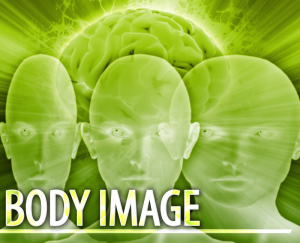One of the most challenging aspects of eating disorders treatment and recovery is dealing with body image. A big reason for this is that the body image expectations depicted in every form of media give the clear message that NO body is acceptable the way it is.
So, if the average person without an eating disorder dislikes his or her body and is trying to tone, build muscle, lose weight, or make some kind of change because they are influenced by these messages, multiply that influence and dislike times one thousand and that may come close to the body hatred people with eating disorders describe.
It’s come to the point that no matter what our weight is, we’ve been conditioned to believe that if we lost five pounds (or more) we’d somehow be better and healthier. When we’re always hearing the drumbeat of this message, directly or indirectly, it’s no wonder why body image dissatisfaction is so rampant.
For those working on recovery from an eating disorder, dealing with body image is a complex and multifaceted issue. They typically developed an eating disorder after they started a diet because they didn’t like their body weight or shape. Those who lose weight due to an eating disorder are never satisfied with how much they have lost and usually want to lose more. Others who develop eating disorders don’t lose weight and still others may even gain weight.
When body functions and mood are dysregulated by malnutrition, weight loss, bingeing, purging, excessive exercise, diet pills, laxatives, etc., body image gets even worse. So, what does it take to improve body image?
The first step is body acceptance. This simply means that the goal is to accept the body as it is for today. Acceptance requires working on not weighing, staring, poking, grabbing, engaging in other methods of body checking or in ways of disparaging the body.
Acceptance of the body as it is today does not require one to love or even like their body. It does require acknowledging the body as it is and moving on to the activities of the day rather than ruminating on body hatred thoughts. No one is forced or destined to think bad body image thoughts – that is a choice and it is possible to make a different choice about what to think! That does take effort.
Accepting the body as it is for today means that better ways of taking care of the body, like nourishing it properly, are possible. It also means that the body can be acknowledged as the vehicle that gets us to school, work, out with friends and the other places we want or need to go. It means remembering that our body houses the brain and heart and, therefore, our knowledge, skills and ability to have loving relationships with those in our lives.
In order for body image to improve beyond acceptance, a recovering person needs to reach and maintain a stable weight through balanced eating, develop other ways of coping to replace and stop eating disorder behaviors and work on developing an identity that is not defined based on their body or weight. But, in the meantime, it is possible to challenge the media messages and accept the many important and necessary things our body does for us every day — instead of focusing only on weight.
Check out the video link on the homepage or ‘LeesPsychological’ Youtube channel for “Mental Health Minute” videos on this and other related topics.

